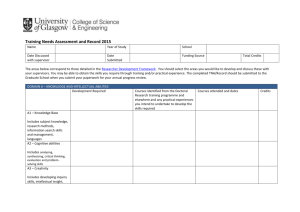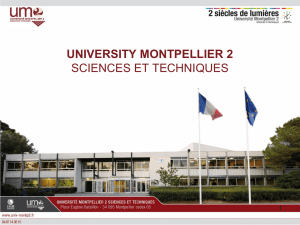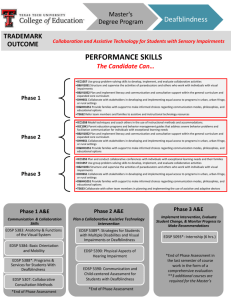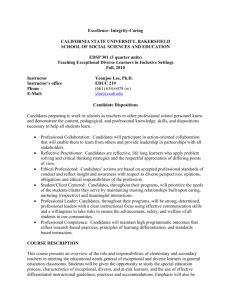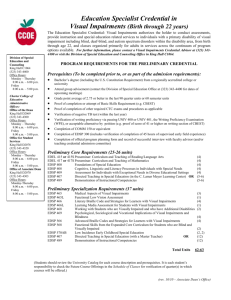Information (WORD) - The Center on Disabilities and Human
advertisement
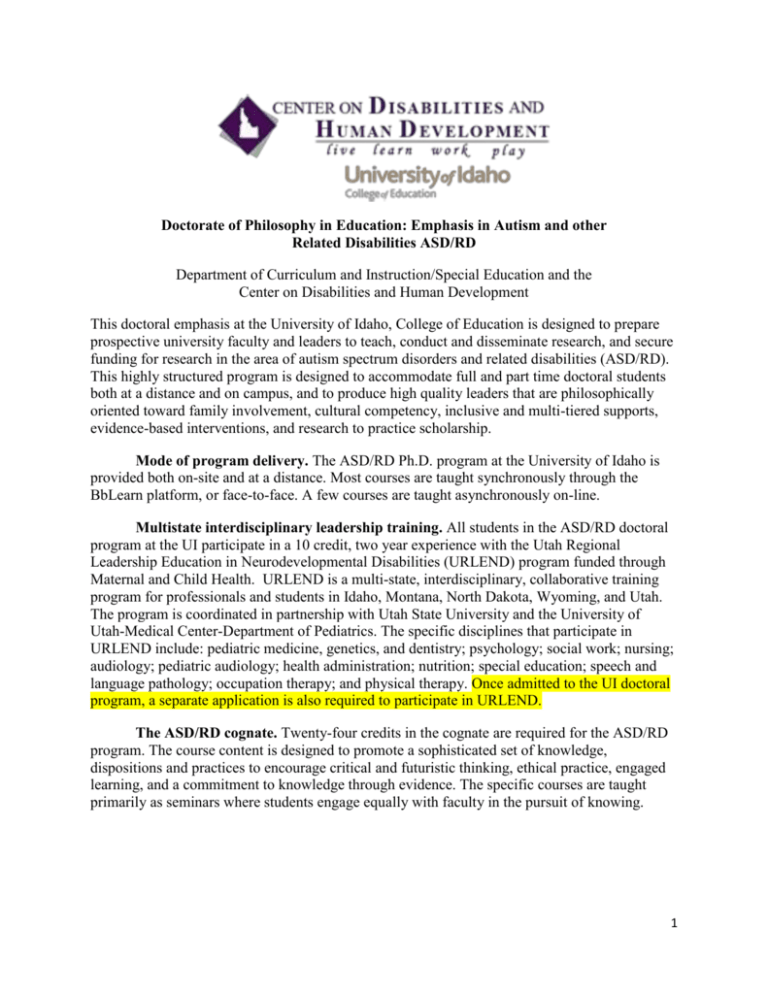
Doctorate of Philosophy in Education: Emphasis in Autism and other Related Disabilities ASD/RD Department of Curriculum and Instruction/Special Education and the Center on Disabilities and Human Development This doctoral emphasis at the University of Idaho, College of Education is designed to prepare prospective university faculty and leaders to teach, conduct and disseminate research, and secure funding for research in the area of autism spectrum disorders and related disabilities (ASD/RD). This highly structured program is designed to accommodate full and part time doctoral students both at a distance and on campus, and to produce high quality leaders that are philosophically oriented toward family involvement, cultural competency, inclusive and multi-tiered supports, evidence-based interventions, and research to practice scholarship. Mode of program delivery. The ASD/RD Ph.D. program at the University of Idaho is provided both on-site and at a distance. Most courses are taught synchronously through the BbLearn platform, or face-to-face. A few courses are taught asynchronously on-line. Multistate interdisciplinary leadership training. All students in the ASD/RD doctoral program at the UI participate in a 10 credit, two year experience with the Utah Regional Leadership Education in Neurodevelopmental Disabilities (URLEND) program funded through Maternal and Child Health. URLEND is a multi-state, interdisciplinary, collaborative training program for professionals and students in Idaho, Montana, North Dakota, Wyoming, and Utah. The program is coordinated in partnership with Utah State University and the University of Utah-Medical Center-Department of Pediatrics. The specific disciplines that participate in URLEND include: pediatric medicine, genetics, and dentistry; psychology; social work; nursing; audiology; pediatric audiology; health administration; nutrition; special education; speech and language pathology; occupation therapy; and physical therapy. Once admitted to the UI doctoral program, a separate application is also required to participate in URLEND. The ASD/RD cognate. Twenty-four credits in the cognate are required for the ASD/RD program. The course content is designed to promote a sophisticated set of knowledge, dispositions and practices to encourage critical and futuristic thinking, ethical practice, engaged learning, and a commitment to knowledge through evidence. The specific courses are taught primarily as seminars where students engage equally with faculty in the pursuit of knowing. 1 Research intensive experience. The research core (18 credits) is designed to provide our graduates advanced skills in both quantitative and qualitative methodology. The majority of research courses are offered by senior faculty who teach in the broad doctoral program through the College of Education. A distinctive three-credit research course in Single Subject Design, commonly used among researchers in special education and other specialized services (Horner et al., 2005), is included in the 18 credit requirement. Senior Graduate Faculty in the College of Education lead three doctoral level seminar courses on grant writing, research proposal preparation, and doctoral orientation. These seminars courses are specifically designed to support and prepare all doctoral level candidates to be successful in their program of studies as well as in their pursuant academic careers in institutions of higher education. Core Faculty. A group of core faculty aligned with Center on Disabilities and Human Development at the University of Idaho support the degree cognate, the URLEND experience, and immersion experience. Other College of Education who participate teach the research and doctoral seminars that are required of all doctoral candidates with in the college. The Core CDHD/UI faculty include: Janice Carson, Ed.D, Director of Assistive Technology Julie Fodor, Ph.D. Director Robin Greenfield, Ph.D. Associate Director-Boise Campus Trevor Hall, Ph.D. Affiliate Faculty Alex Hollingshead, Ed.D. Gwen Mitchell, Ph.D. Idaho Coordinator for URLEND, Clinical Services Supervisor For more information contact: Julie A. Fodor Ph.D. Director, Center on Disabilities and Human Development 208 885-6128 jfodor@uidaho.edu 2 Doctoral Program Course Requirements University of Idaho‐Doctorate in Philosophy (PhD) Emphasis: Special Education/Autism Spectrum Disorders and Related Disabilities (ASD/RD) Program Requirements Credits Earned Semester Completed Doctoral Core 8 Credit Hour ED 604 Grant‐writing and External Funding 3 ED 604 Writing for Publication 3 ED 611 Doctoral Seminar I 1 ED 612 Doctoral Seminar II 1 Specialization URLEND/ASD 10 course credits Immersion 6 credits EDSP 552 Principles of Leadership in Neurodevelopmental Disorders I 3 EDSP 553 Principles of Leadership in Neurodevelopmental Disorders II 3 EDSP 554 Foundations in Autism Spectrum Disorders I 2 EDSP 555 Foundations in Autism Spectrum Disorders II 2 EDSP 597 Internship/Immersion: College Teaching 3 EDSP 597 Internship/Immersion: Research 3 Research 18 Credit Hours (Required) ED 680 Philosophies of Research 3 ED 574 Introduction to Qualitative Research 3 ED 571 Introduction to Quantitative Statistics 3 EDSP 531 Single Subject Design Research 3 3 (Electives) ED 595 Survey Design/Implementation 3 ED 584 Intermediate Quantitative 3 ED 587 Advanced Quantitative 3 ED 589 Designing and Conducting Qualitative Research 3 ED 590 Qualitative Research: Writing, Critiquing, Practice and Application 3 *Note: Course work outside the college may be substituted (e.g., Statistics) Cognate (may be transferred from masters) 24 Credit Hours EDSP 540 Applied Behavior Analysis 3 EDSP 530 Universal Design and Assistive Technology 2 EDSP 504 Foundations of Neurodevelopment 3 EDSP 504 Evidence based Practice /Interventions (two semesters 2 credits each semester) 4 Doctoral Seminar: Trends and Topics in Developmental Disabilities (four semesters 2 credits each semester) 8 Electives 3 Dissertation 18 Credit Hours ED 600 Dissertation 18 Doctoral Core 8 Specialization10 Immersion 6 Research courses 18 Cognate 24 Dissertation 18 Total 84 Other Requirements: Doctoral Requirements Description Date Completed 1. Preliminary Exam 2. Article for Publication 4


